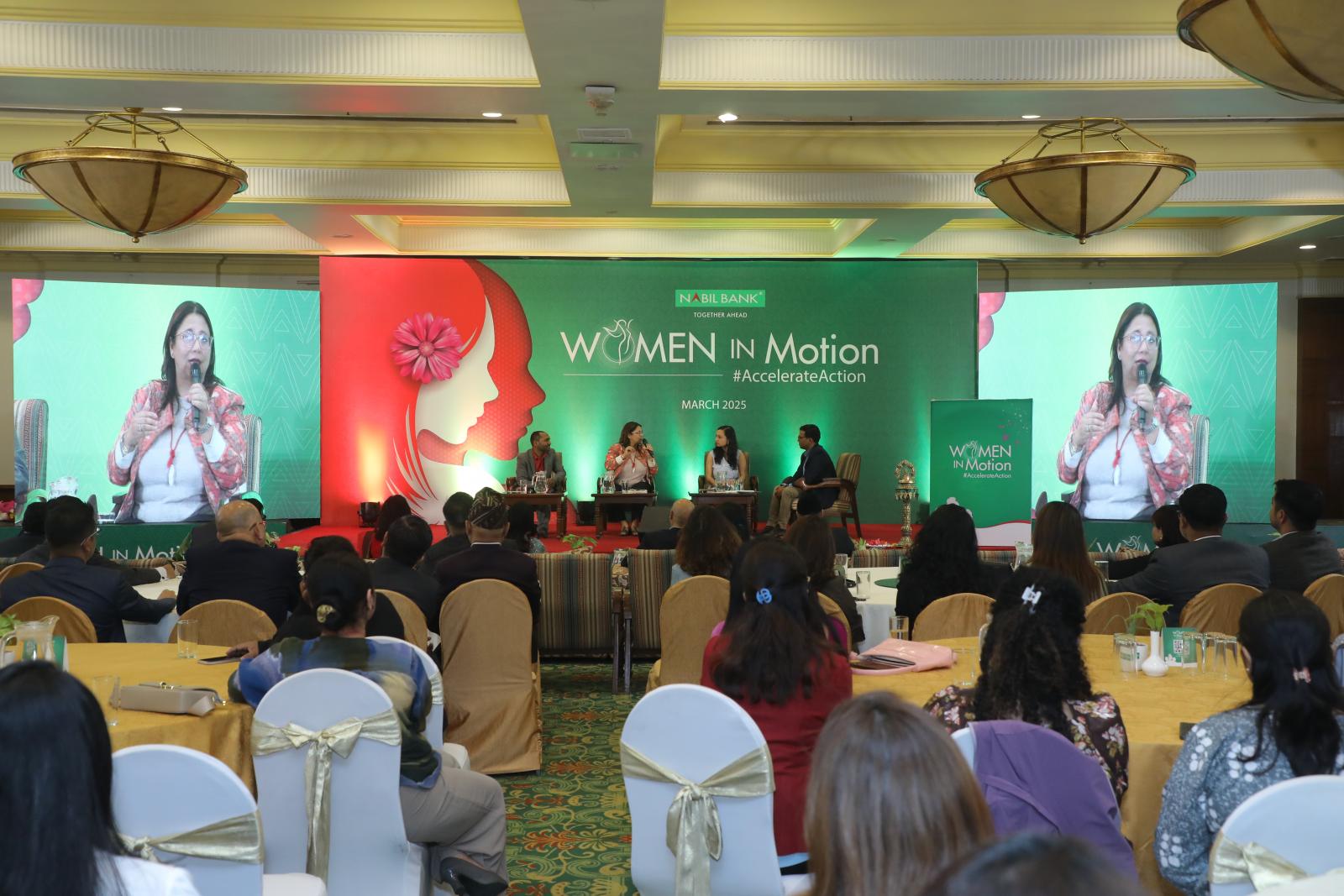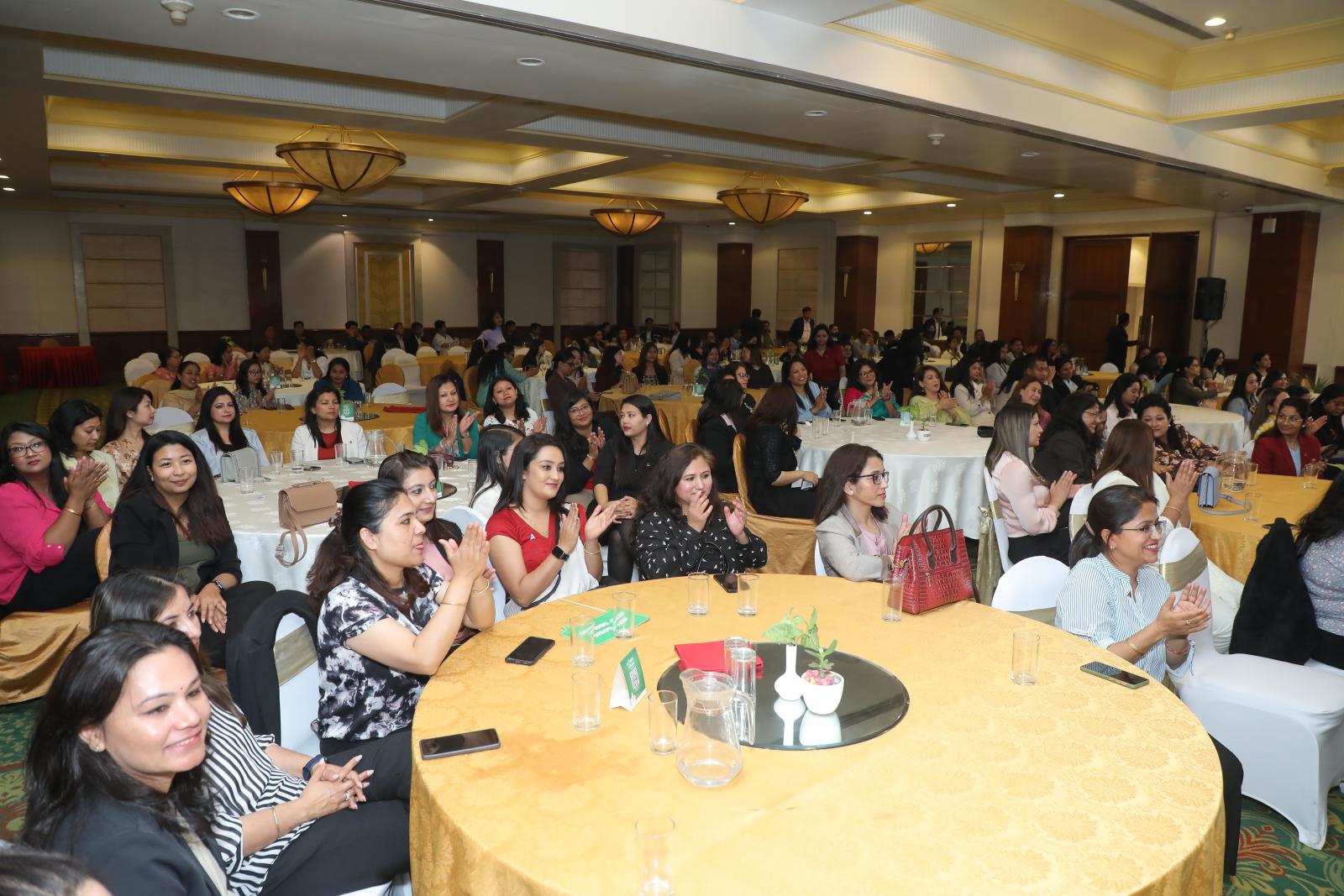Nabil Bank Concludes ‘Women in Motion – Accelerate Action’ Program in Kathmandu
Kathmandu – Nabil Bank successfully concluded the ‘Women in Motion – Accelerate Action’ program on Monday in Kathmandu. The program was organized to promote women’s empowerment, capacity enhancement, inclusivity, gender equality, and awareness.
The event was inaugurated by Sarita Bhatt Adhikari, an independent director of Nabil Bank. Speaking at the program, Upendra Prasad Paudel, Chairman of Nabil Bank, reaffirmed the bank’s commitment to empowering women, enhancing their capacities, and providing opportunities. He acknowledged that although women face challenges in the banking sector, there is no alternative but to overcome them and move forward.
“We are committed to maintaining gender equality. When gender inclusivity is ensured, it has a positive impact across all sectors,” said Chairman Paudel. He highlighted that, historically, women have been paid less than men, but this trend is now changing. “Workplace violence against women still exists, and there are challenges, but Nepal has identified these issues and is progressing toward solutions,” he added. Paudel emphasized that Nabil Bank is dedicated to bringing women into leadership positions, giving them decision-making roles, and creating more opportunities. He also stressed the importance of removing long-standing inequalities in society and recognizing the role of women in economic development.
Need for More Women in Leadership
At the event, Manoj Gyawali, Acting Chief Executive Officer of Nabil Bank, emphasized the necessity of increasing women's leadership in the banking sector. He pointed out that women’s representation in leadership positions is still low and expressed confidence that programs like this would help increase participation and motivation.
“It is crucial to increase women’s participation in managerial leadership in the banking sector. Women think differently than men; they are more focused and analytical in their approach,” Gyawali said. He also highlighted that women tend to excel in governance, and cases of misconduct leading to dismissal are significantly lower among women than men. According to him, Nabil Bank has successfully maintained a significant presence of women in its workforce.
“It is not easy for women to move forward alongside men. They must balance work and household responsibilities, often getting stuck in between,” he noted. “This is one reason why women’s representation in many sectors is not as expected. To create an inclusive workplace, it is essential to increase women’s participation.” He emphasized that rather than merely discussing women’s issues, the focus should be on gender equality.
Women’s Empowerment and the Role of Men
The event’s chief guest, Asrayata Karki Chaudhary, Chairperson of Nepal Super League, praised Nabil Bank’s initiative, calling it a significant step toward achieving gender equality.
“By investing in women’s empowerment, Nabil Bank has contributed not only to creating an inclusive workplace but also to the country’s overall economic development,” she said. “Women have played a crucial role in bringing Nabil Bank to where it is today.”
She also highlighted the importance of men’s role in women’s empowerment and urged everyone to support women in their homes, workplaces, and society. “For women to build sustainable careers in sports, banking, or any other field, opportunities alone are not enough. Cultural changes are necessary,” she stated. She emphasized the need to invest in young girls from an early age, encouraging them to pursue their aspirations without fear.
According to her, women’s participation brings not only skills and expertise but also new perspectives, ideas, and collaboration, making a significant impact. “Women cannot move forward alone in a male-dominated society. Building networks and fostering collaboration are essential for achieving goals,” she added.
Panel Discussion on Overcoming Barriers to Women’s Leadership
The event featured a panel discussion on “The C-Shift: Navigating Barriers and Catalyzing Leadership,” where speakers emphasized that women are capable of leading in various sectors and should be given opportunities.
The discussion included environmental activist Silshila Acharya, Rosie Kattel, and Dr. Ramji Ram, who shared insights on women’s participation, empowerment, and opportunity creation. The session was moderated by Yagya Banjade, Senior Sub-Editor of Kantipur.
More than 200 employees, both male and female, along with Nabil Bank’s senior officials, participated in the program.
Nabil Bank’s Commitment to Women’s Empowerment
Apart from this event, Nabil Bank organized multiple programs throughout March focused on women’s empowerment. These initiatives aimed to promote gender equality, raise awareness, enhance individual capacities, and build a supportive community.
As part of these efforts:
-
The ‘March into Wellness’ program benefited 35 female employees from both inside and outside the Kathmandu Valley.
-
The ‘Well-being of Women’ session provided support to 100 female employees working in the valley.
-
A nationwide rally was organized on International Women’s Day, with over 1,200 employees from Nabil Bank’s branches across the country participating.
-
A program on workplace violence and preventive measures was conducted in Koshi Province, benefiting 68 female employees.
-
In Madhesh Province, a session on “Safe and Dignified Workplaces” was organized, benefiting 50 employees.
-
A session was also held for all bank employees on menstrual health challenges.
Nabil Bank’s Leadership in Banking
Nabil Bank is one of Nepal’s leading commercial banks, serving over 2.4 million customers through 268 branches and 320 ATMs. For 40 years, the bank has played a key role in introducing innovative banking services and contributing to the development of Nepal’s financial sector. With its customer-centric approach, Nabil Bank remains committed to providing high-quality banking services and driving financial progress in Nepal.




